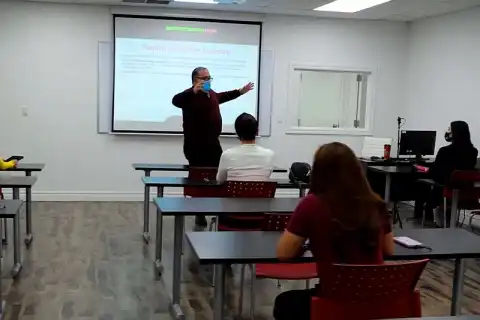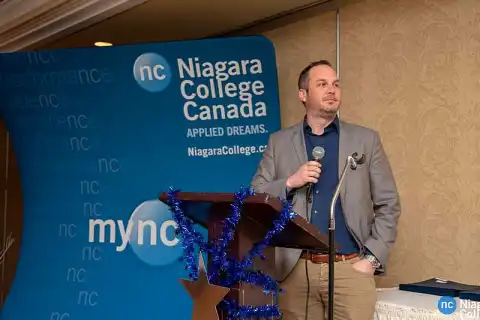Advanced Diploma - Culinary Innovation and Food Technology (Co-op)
- 3 years
- Duration
- 63,546 CAD
- Price
- Rolling admission
- Start
- Rolling admission
- Deadline
- Diploma
- Degree
- Campus
- Format
- Niagara-on-the-Lake / Canada
- Location
Program description
Do you want to work in a field that ensures the production of delicious and safe food from farm to table by fusing culinary expertise with food science?
You will be a culinary inventor with the special capacity to create and enhance foods, goods, and operations; lower the risk of food safety and guarantee that regulations are followed; and offer nutritional labeling and analysis as a graduate of Culinary Innovation and Food Technology.
Highlights
- Cutting-edge tools and facilities.
- The Niagara College School of Culinary Arts enjoys an exceptional reputation among its alumni, employers, and industry partners.
- A co-op work term provides an integrated work experience that integrates learning in product development and food science.
- Many students have access to chances for applied research through collaboration with the Research and Innovation Center.
Program structure
Term One
- Introduction to Food Chemistry
- Introduction to Product and Process Engineering
- Introduction to Food Principles
- Nutrition
- Garde Manger I
- Culinary Techniques I
- Culinary Essentials
Term Two
- Language and Communications
- Nutrition for Food Technology
- Understanding Quality Ingredients
- Garde Manger II
- Culinary Techniques II
- Baking Essentials
Term Three
- Integrated Baking Production for the Processing Engineer
- Introduction to Microbiology
- Food Chemistry I
- I-Think: The Science of Thinking and Problem Solving
- Food Law and Regulations
- Food and Wine Dynamics
- Algebra & Trigonometry
Term Four
- Food Microbiology I
- Technical Communications
- Functional Ingredients and Additives
- International Cuisine in Food Development
- Packaging and Shelf Life Analysis
- Product and Process Engineering I
- Statistical Concepts
Term Five (Co-Op)
- Co-op Work Term
Term Six
- Food Chemistry II
- Modern Culinary Applications
- Preserving and Curing
- Product and Process Engineering II
- Quality Control
- Culinary Innovation
Elective Information
- Completion of additional General Education elective 1 course required
Term Seven
- Financial and Managerial Accounting
- Food Sensory Analysis
- Food Microbiology II
- Recipe Development
- Food Research and Capstone Project
Price
Level One
- Tuition — 8,225 CAD
- Ancillary Fees — 2,682 CAD
- Material Fees — 1,065 CAD
- Level Total — 11,972 CAD
Level Two
- Tuition — 8,225 CAD
- Ancillary Fees — 1,005 CAD
- Material Fees — 1,315 CAD
- Level Total — 10,545 CAD
Year One Total: 22,518 CAD
Level Three
- Tuition — 8,225 CAD
- Ancillary Fees — 2,343 CAD
- Material Fees — 456 CAD
- Level Total 11,024 CAD
Level Four
- Tuition — 8,225 CAD
- Ancillary Fees — 1,199 CAD
- Material Fees — 137 CAD
- Level Total — 9,561 CAD
Level Five
- Co-op/work terms have no tuition cost, however the co-op fee(s) in previous terms covers administration of this term.
Year Two Total: 20,585 CAD
Level Six
- Tuition — 8,225 CAD
- Ancillary Fees — 1,921 CAD
- Material Fees — 552 CAD
- Level Total — 10,698 CAD
Level Seven
- Tuition — 8,225 CAD
- Ancillary Fees — 961 CAD
- Material Fees — 558 CAD
- Level Total — 9,744 CAD
Year Three Total: 20,443 CAD
Estimated Program Total: 63,546 CAD
Requirements for applicants
Admission Requirements
- Ontario Secondary School Diploma (OSSD), or equivalent including the following required course(s):
- English – any Grade 12 (C) or (U), or equivalent
- Mathematics – any Grade 12 (C) or (U), or equivalent
Recommended Courses and/or Skills (these courses and skills may help you succeed academically in this program, but they are not required for admission)
- Biology – Grade 11 (C) or (U) or Grade 12 (U)
- Chemistry – Grade 11 (U) or Grade 12 (C) or (U)
Language Proficiency Admission Requirements
You will be required to provide proof of one or more of the following:
- Niagara College Mature Student Test for English
- Grade 12 English at the C or U level (Ontario High School Curriculum)
- ACE English (Academic Upgrading)
- International Credential Assessment for studies outside of Canada
If English is your subsequent language, Niagara College (for the purposes of admission to standard non-competitive programs) will also accept these English Language Test Scores
- Cambridge English Exams (B2 First/FCE, C1 Advanced/CAE or C2 Proficiency/CPE) - 169 – No skill under 162
- International English Language Testing System (IELTS) including Indicator Test** 6.0 – No individual band under 5.5.
- Duolingo Language Test - Overall score of 105+, with no individual score under 95
- Internet-based (IBT) Test of English as a Foreign Language (TOEFL) including Special Home Edition Test - Paper-based: 500, Computer based: 173, iBT: 79, Minimum: 20 Writing, 20 Speaking
- Pearson Test of English (PTE) - 46+, with no individual skill under 36
- Canadian Academic English Language Test (CAEL) including CAEL Online Proficiency Test - 60 – No individual band under 50.
- Niagara College’s English for Academic Preparation program (EAP) - Completion of Level 5 English for Academic Preparation (EAP) program with 70% and no individual grade under 50%
About the university

Niagara College, with campuses in Welland and Niagara-on-the-Lake, is conveniently located in the center of the Niagara Region, only minutes away from one of the world's most popular tourist destinations. The college is home to more than 130 cutting-edge academic programs.
All of our campuses are home to state-of-the-art facilities and innovative teaching methods, including small class sizes, cutting-edge research, and real-world application.
These courses put students in an interactive and technologically advanced learning environment. Our grads are well-versed in multiple cultures, quick learners, and risk takers who push the envelope of what's possible in business in Niagara, Canada, and beyond.
Why Niagara College?
- 130+ certificate, diploma, apprenticeship and Bachelor's Degree programs
- 600+ credit, vocational and general interest courses
- We care about you and want you to succeed - employers report high levels of satisfaction with the skills and knowledge possessed by NC graduates.
- Building a sustainable future
- More than seven thousand students per year participate in cooperative education, field placements, internships, learning enterprises, apprenticeships, clinical placements, course-based research, and fieldwork in about one hundred different academic disciplines.





